

World's biggest sovereign wealth fund to ditch fossil fuels. The world’s largest sovereign wealth fund, which manages $1tn (£786bn) of Norway’s assets, has been given the go ahead for the largest fossil fuel divestment to date by dropping more than $13bn of investments.
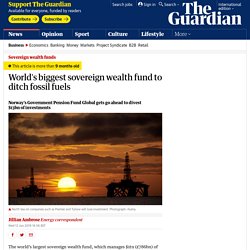
Norway’s parliament voted plans into law on Wednesday for the fund to dump investments in eight coal companies and an estimated 150 oil producers. The divestment plan means the fund will drop coal investments worth an estimated $6bn, which could include shares in the mining companies Anglo-American, Glencore and the German energy firm RWE. The Government Pension Fund Global, which is built on Norway’s legacy oil earnings, will also move ahead with plans to scrap investments worth $7bn in oil exploration and production companies.
It will, however, retain stakes in oil companies which are limiting their exposure to fossil fuels by investing in clean energy technologies. These include BP and Shell, but rule out London-listed North Sea companies including Premier Oil and Tullow Oil. Researchers Say Big Energy Companies Must Invest Heavily in Renewables by 2035. In Brief Research analysts say that the largest oil and gas companies must invest heavily in renewables by 2035 to avoid risk to their core business.

This simple financial reality may support the climate change goals of the Paris Accord. Global Changes In Energy. This is how Big Oil will die – Seth Miller – Medium. It’s 2025, and 800,000 tons of used high strength steel is coming up for auction.
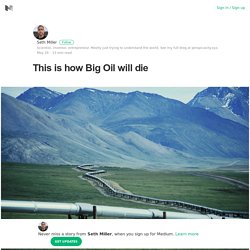
The steel made up the Keystone XL pipeline, finally completed in 2019, two years after the project launched with great fanfare after approval by the Trump administration. The pipeline was built at a cost of about $7 billion, bringing oil from the Canadian tar sands to the US, with a pit stop in the town of Baker, Montana, to pick up US crude from the Bakken formation. The Peak Oil President? Post Carbon Institute. The frequency of Internet searches for the term “peak oil” has waned dramatically in recent years; now even the number of articles announcing the “death” of peak oil has dwindled, so universal is the assumption that the concept is completely debunked.
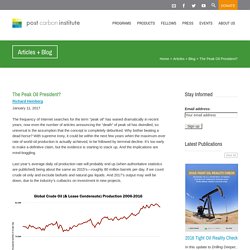
Why bother beating a dead horse? With supreme irony, it could be within the next few years when the maximum-ever rate of world oil production is actually achieved, to be followed by terminal decline. It’s too early to make a definitive claim, but the evidence is starting to stack up. And the implications are mind-boggling. Last year’s average daily oil production rate will probably end up (when authoritative statistics are published) being about the same as 2015’s—roughly 80 million barrels per day, if we count crude oil only and exclude biofuels and natural gas liquids.
Rockefeller family charity to withdraw all investments in fossil fuel companies. A charitable fund of the Rockefeller family – who are sitting on a multibillion-dollar oil fortune – has said it will withdraw all its investments from fossil fuel companies.
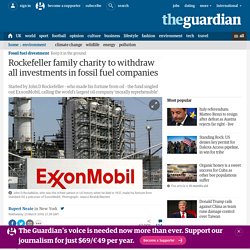
The Rockefeller Family Fund, a charity set up in 1967 by descendants of John D Rockefeller, said on Wednesday that it would divest from all fossil fuel holdings “as quickly as possible”. The fund, which was founded by Martha, John, Laurance, Nelson and David Rockefeller, singled out ExxonMobil for particular attention describing the world’s largest oil company as “morally reprehensible”. John D Rockefeller, who was the richest person in US history when he died in 1937, made his fortune from Standard Oil a precursor of ExxonMobil. “There is no sane rationale for companies to continue to explore for new sources of hydrocarbons,” the RFF, which has relatively small total holdings of $130m (£92m), said in a statement.
RFF is not the first Rockefeller family organisation to vow to divest from fossil fuels. Financial Times - Paid Post by BP. Fossil fuels investment takes nosedive - Climate News NetworkClimate News Network. Energy experts say global investment patterns show a spectacular shift, with renewables on the rise and support for fossil fuels in sharp decline.
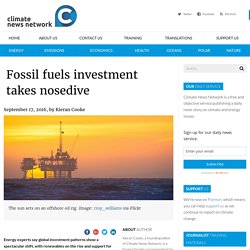
LONDON, 17 September, 2016 – A revolution is taking place in the global energy sector, with investments in oil and gas declining by 25% in 2015 while energy produced from renewables rose by more than 30%. “We have never seen such a decline [in oil and gas investment]”, said Dr Fatih Birol, executive director of the International Energy Agency (IEA), at the London launch of its first ever report into world energy investment.
“Our findings carry a very important message for climate change and for the Paris agreement. Oil majors told to adapt or die - Climate News NetworkClimate News Network. As profits and prices plummet, the oil conglomerates – some of the world’s biggest companies – have been warned they must change their ways or face extinction.

LONDON, 9 May, 2016 – At best, big oil companies such as ExxonMobil, Shell, Chevron and BP face a period of gentle decline, but will ultimately survive. At worst, if they do not adapt and change direction, “what remains of their existence will be nasty, brutish and short”. That’s the core message of a research paper on the oil corporates by one of the UK’s leading energy experts, Paul Stevens, a senior research fellow at the London-based Chatham House thinktank, the Royal Institute of International Affairs. Present management strategies within the oil majors have failed to deliver value to shareholders, and profits are declining sharply, Stevens says. Impact on climate. Cookiewall. New Energy Consumer: Thriving in the Energy Ecosystem-Accenture.
Oil Majors Lost One Engine; Now the Second One Is Sputtering. If Big Oil was a two-engine airplane, you could say it’s been flying on a single engine since energy prices crashed in 2014.
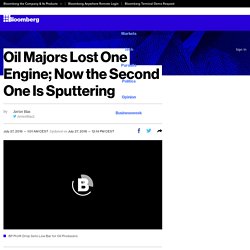
Now, the second motor is sputtering. The major integrated oil companies, including Exxon Mobil Corp., Total SA and BP Plc, have relied on their so-called downstream businesses, which include refining crude into gasoline, oil trading and gas stations, to cushion the losses on their upstream units, which pump crude and natural gas. “The crash in oil prices in late 2014 brought refineries worldwide a pleasant surprise: booming margins,” said Amrita Sen, chief oil analyst at consulting firm Energy Aspects Ltd. in London. “But now, the market is changing.” BP, the first major to report second-quarter results, showed the impact on Tuesday. BP makes record loss and axes 7,000 jobs. BP is to axe another 7,000 jobs after reporting an annual loss of $6.5bn (£4.5bn), the worst in its history.
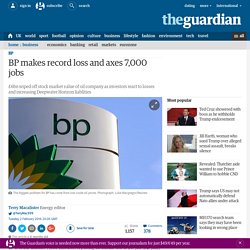
Shares in the oil company dived 8.6% to 335p by the end of trading on Tuesday, wiping almost £6bn off the stock market value of the business, and helped drag down the wider FTSE 100 index of leading shares in London. The poor financial performance of BP, followed by a 68% fall in quarterly profits from rival Exxon Mobil in the US and further weakness in the price of crude, depressed stock markets on both sides of the Atlantic on Tuesday.
The FTSE 100 finished the day down 2.2% at 5922.01 points, while in New York, the Dow Jones fell more than 230 points, or 1.4%, in early trading. 2015 Oil and Gas Trends. Industry perspectives Roiled by global economic turmoil, untamed competition, and mind-numbing price swings, energy companies must be bold about transforming their business models.
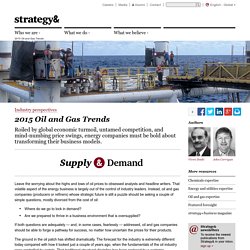
Leave the worrying about the highs and lows of oil prices to obsessed analysts and headline writers. IEA sees slower global gas demand growth to 2021. BRUSSELS Growth in natural gas demand will slow to an average 1.5 percent a year globally through 2021, as stagnation in Europe and uncertainty about Chinese consumption offsets robust growth in India, the International Energy Agency (IEA) said on Wednesday. After growth of 2.5 percent over the last six years, gas is facing competition from renewable energy and cheap coal, meaning the global gas market will remain over supplied.
World oil demand and supply could hit 100 million barrels per day by 2018 or 2019. Canadian government thinktank warns that renewables will gut market for Canada's dirty oil / Boing Boing. For a decade, Canada's previous petro-tory government prosecuted scientists who publicly reported their results without first passing them through the party's commissars, almost as though reality had a well-known left-wing bias and couldn't be trusted.
Stephen Harper's Tories have been out of office for less than a year and now we're starting to learn what Canada's researchers had been unable to tell the country about the state of the land and the world. Most recently, Policy Horizons Canada -- a Canadian government think-tank that focuses on medium-term predictions -- has warned the government that global adoption of renewables is coming on faster than predicted, and shows signs of accelerating, which means that Canada's economy is in danger -- thanks to a decade of orienting the country around exporting some of the dirtiest oil on the planet, at the expense of high-tech manufacturing industries. ExxonMobil, Rockefellers face off in climate battle. US energy giant ExxonMobil is facing an onslaught from environmentalists and some shareholders alleging it hid what it knew about the effects of fossil fuels on climate change.
In an ironic twist: among the opponents is the Rockefeller Family Fund, built on the fortune amassed by John D. Rockefeller, founder of Standard Oil, which became Esso, then Exxon and then, in 1999, ExxonMobil. The RFF met last January, in secret, in Manhattan with environmental nongovernmental groups "to establish in the public's mind that Exxon is a corrupt institution that has pushed humanity (and all creation) towards climate chaos and grave harm," according to an internal document on the meeting seen by AFP. "We hosted a meeting with leading advocates to understand their thoughts on how to best respond to the outrageous conduct," Lee Wasserman, the director of RFF, told AFP. "We want everyone we can think of to know it broke every kind of moral law," McKibben said in an email. Investors warned: Forget fossil fuels - Climate News NetworkClimate News Network. Corporate winners and losers amid the oil price crash.
Investors Could Drag Exxon Kicking And Screaming Into A Low Carbon Economy. ExxonMobil is not having a good week. First, the Securities and Exchange Commission ruled that the company has to allow shareholders to vote on a climate change resolution. Then, the Rockefeller Family Fund announced it would divest from fossil fuels — and took the opportunity to hit Exxon specifically for misleading investors about the risks of climate change. Exxon is one of the world’s largest oil and gas firms. With a business model that is almost entirely dependent on the exploration, extraction, refinement, transportation, and sale of oil and gas, Exxon is also one of the largest contributors of human-generated greenhouse gases. Oil and gas is still a lucrative business.
The top five investor-owned companies on the list — Chevron, ExxonMobil, British Petroleum, Shell, and ConocoPhillips — are responsible for one-eighth (12.5%) of all industrial carbon emissions from 1854 to 2010. The Economist. OIL traders are paying unusual attention to Kharg, a small island 25km (16 miles) off the coast of Iran. On its lee side, identifiable to orbiting satellites by the transponders on their decks, are half a dozen or so huge oil tankers that have been anchored there for months. Farther down Iran’s Persian Gulf coast is another flotilla of similarly vast vessels.
They contain up to 50m barrels of Iranian crude—just what a world awash with oil could do without. Why the price of oil will recover faster than you think. Multi-decade reductions in Oil usage from shift to solar, batteries and nuclear will have geopolitical impacts on OPEC nations. People have mainly been looking at the shift to electric cars over the next few decades in terms of an overall environmental impact. This would slow climate change by reducing emissions and air pollution. Industry optimism building for oil and gas production in Quebec.
Oil and gas players like Questerre Energy Corp. are turning their sights to Quebec for growth as prospects sour in Alberta under the weight of regulatory and market uncertainty. Japan Today. TROUBLING: Oil and gas companies are edging towards default. Bp technology outlook. Canada’s days as an energy super-power are over and the oil crash is only one culprit. This article appears in the October edition of the Financial Post Magazine. Visit the iTunes store to download the iPad edition of this month’s issue.
Oversupply of oil through at least 2016. Oil prices rose on Tuesday with technical support for U.S. crude and despite a weaker demand outlook from the International Energy Agency (IEA) which is expected to keep the world oil market oversupplied for at least another year. Brent futures for November delivery rose 38 cents to $50.24 a barrel, a 0.8 percent gain, by 11:13 a.m EDT (1513 GMT). U.S. crude rose 99 cents or 2.1 percent to $48.09 per barrel. Total Collapse In Interest For Oil Assets: Brazil Oil Auction Is Near Complete Failure.
Natural gas prices in Asia mainly linked to crude oil, but use of spot indexes increases. September 29, 2015. Changing the climate for fuel subsidies. Financial Sector To Cut Credit Supply Lines For Oil And Gas Industry. Forbes Welcome. North Sea oil and gas industry investment hailed by Chancellor. Oil and gas pipeline partnerships still look like bargains. UK's oil and gas industry braces for further job cuts. Shell Didn't Quit Alaska Out of the Goodness of Its Heart. Volkswagen scandal widens: $7.3 billion cost, 11 million cars - Sep. 22, 2015. Oil industry risks trillions of 'stranded assets' on US-China climate deal. Are stranded assets wearing down the oil and coal industries? Diesel drivers could face higher taxes as pollution targets are missed. Motorists face hefty car tax hikes as green cars leave black hole for Treasury. Government rejects diesel tax increases but will consider emission zones.
Dirty diesel cars could be banished as Britain ordered to cut air pollution. The argument for divesting from fossil fuels is becoming an overwhelming one. Have diesel cars been unfairly demonised for air pollution? Are diesel cars about to be phased out due to pollution ruling? Price of diesel drops to five-year low at 112.95p per litre - making it cheaper than petrol for first time in 14 years UK diesel prices drop below petrol for first time in 14 years.
Diesel cheaper than petrol after supermarkets cut prices - BBC News. Diesel 'drought' in Britain's forecourts as local refineries close and higher dependence on foreign fuel. The Emerging Megatrend Coming To Oil & Gas. The New Oil Order: in charts — FT. US shale has been stymied by Saudi Arabia, says Shell CEO — FT. Cheap oil endangers poorer nations’ switch to renewable energy — FT.